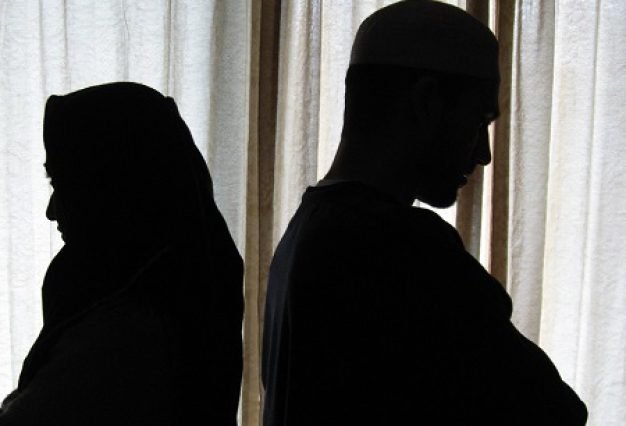Answered by Shaykh Yūsuf Badāt
Question:
My husband, Hasan had granted me the authority to divorce myself (tafwīḍ al-ṭalāq). Muftī Abdul Mannan of Pickering masjid in Ontario had provided a written document confirming the validity of the tafwīḍ al-ṭalāq al-bāin. The letter is attached. I exercised my right and have divorced myself by saying the following, “I Haseena Hasan have exercised the right to give myself a talāq based on the tafwīḍ al-ṭalāq that Hasan gave me.” I exercised my right to the tafwīḍ al-ṭalāq on Saturday March 4, 2023 in the presence of four witnesses (over the phone). Hasan came into the house that same day and I told him in person that the tafwīḍ al-ṭalāq had been used and I am starting my ‘iddah.
Please kindly inform me according to the Shari’ah, is my divorce effective and finalized or am I still in the nikāḥ of Hasan. I am being told that I may not be religiously divorced since Hasan apparently put a verbal condition that I must say the divorce pronouncement in his presence and that I must also consult Islamic scholars first. Please note that there has been a restraining order by the police therefore I cannot be in his presence and I did consult scholars including, Muftī Abdul Mannān. With these details, please advise me if I am divorced religiously according to the law of Islam or not?
Answer:
In the Name of Allāh, the Almighty, the Most Merciful, the Most Kind.
We are sorry to hear your situation and pray for the best of well-being for you and the family.
In response to your query, kindly note that the tafwīḍ al-ṭalāq (delegation of Islamic divorce) that was granted to you by your husband was valid. We have reviewed the document authored by Muftī Abdul Mannān of Pickering masjid, spoken to him, as well as spoken to Hasan himself.
As far as your nikāḥ with Hasan is concerned, it has terminated the day you had exercised your right by articulating the divorce and notifying Hasan, regardless of how he was notified (in person, over an audio/ text message or through a third party). The religious reasonings as per Islamic law have been explained below and also referenced.
Tafwīḍ al-ṭalāq incorporates the act of “tamlīk” which means “passing on the ownership”. In other words, the very authority and ownership of ṭalāq that belongs to the husband is transferred to the wife. Hence in this situation, just as the husband has the authority to exercise divorce, the wife would have that same right. You have used your right and therefore you are islamicaly divorced. – (See: Badā’i Al-Ṣanā’I, Vol 3, Page 113, Dār Al-Kutub Al-‘Ilmiyyah[1], Al-Bināyah, Vol 5, Page 393, Dār Al-Kutub Al-‘Ilmiyyah[2], Kitāb Al-Āthār, Vol 1, Page 485, Dār Al-Nawādir[3], Jadīd Fiqhī Masāil Li-Al-Raḥmānī, Vol 3, Page, 31, Zam Zam Pulishers)
The condition of articulating your right of pronouncing divorce in your husband’s presence is an invalid condition in your case. The document clearly states that Hasan has authorized you to divorce yourself “without any limitations” and “how you choose”. The other matter is that under Islamic law, when a wife is given no limitation of time, to exercise her right of divorce, then the condition of space and or in person presence (majlis) becomes invalid. In such a situation, a wife can choose to divorce herself anytime, regardless of where she does it. The divorce in this scenario is connected to the time, not the space. – (See: Al-Fatāwa Al-Hindīyyah, Vol 1, Page 403, Dār Al-Fikr[4], Badā’i Al-Ṣanā’I, Vol 3, Page 115, Dār Al-Kutub Al-‘Ilmiyyah[5], Rad Al-Muḥtār, Vol 3, Page 331, Dār Al-Fikr[6], Al-Bināyah, Vol 5, Page 394[7], 402[8], 403[9] & 404[10], Dār Al-Kutub Al-‘Ilmiyyah, Al-Jām’I Al-Ṣaghīr Ma’a Al-Nāf’I Al-Kabīr, Page 213, Idārah Al-Qur’ān Wa Al-‘Ulūm Al-Islāmiyyah[11])
It is also worthy to note that exercising the right of divorce although preferred, is not dependent on consulting Islamic scholars. Your official document also states “consultation from a trusted scholar is advised”. This is a statement of advice and not a condition.
In summary, you are religiously divorced through an irrevocable divorce (ṭalāq bāin) and no longer are in the religious marriage of Hasan. If three menstrual cycles have passed after the divorce pronouncement, your ‘iddah is also complete.
And Allāh Knows Best.
[1]لِأَنَّهُ مَلَّكَهَا الطَّلَاقَ وَمَنْ مَلَّكَ غَيْرَهُ شَيْئًا فَقَدْ زَالَتْ وِلَايَتُهُ مِنْ الْمِلْكِ فَلَا يَمْلِكُ إبْطَالَهُ – كتاب بدائع الصنائع في ترتيب الشرائع ج ٣/ ص ١١٣ دار الكتب العلمية
[2] وإن قال لها طلقي نفسك فليس له أن يرجع عنه لأن فيه معنى اليمين لأنه تعليق الطلاق بتطليقها واليمين تصرف لازم – كتاب البناية شرح الهداية ج ٥/ ص ٣٩٣ دار الكتب العلمية
[3] اذا اختارت نفسها فهي واحدة وهي املك بنفسها وهو قول ابي حنيفة – كتاب الاثار للشيباني ج ١/ ص ٤٨٥ دار النوادر
[4] وَإِنْ قَالَ لَهَا طَلِّقِي نَفْسَكِ مَتَى شِئْتِ فَلَهَا أَنْ تُطَلِّقَ فِي الْمَجْلِسِ وَبَعْدَهُ وَلَهَا الْمَشِيئَةُ مَرَّةً وَاحِدَةً وَكَذَا قَوْلُهُ مَتَى مَا شِئْتِ وَإِذَا مَا شِئْتِ وَلَوْ قَالَ كُلَّمَا شِئْتِ كَانَ ذَلِكَ لَهَا أَبَدًا حَتَّى يَقَعَ ثَلَاثًا كَذَا فِي السِّرَاجِ الْوَهَّاجِ – الفتاوى الهندية ج ١/ ص ٤٠٣ دار الفكر
[5] فَإِنْ أَطْلَقَ الْوَقْتَ بِأَنْ قَالَ أَمْرُكِ بِيَدِكِ إذَا شِئْتِ أَوْ إذَا مَا شِئْتِ أَوْ مَتَى مَا شِئْتِ أَوْ حَيْثُمَا شِئْتِ فَلَهَا الْخِيَارُ فِي الْمَجْلِسِ وَغَيْرِ الْمَجْلِسِ وَلَا يَتَقَيَّدُ بِالْمَجْلِسِ حَتَّى لَوْ رَدَّتْ الْأَمْرَ لَمْ يَكُنْ رَدًّا – كتاب بدائع الصنائع في ترتيب الشرائع ج ٣/ ص ١١٥ دار الكتب العلمية
[6] وَلِذَا قَالَ فِي الْكَافِي لَوْ قَالَ لَهَا طَلِّقِي نَفْسَك وَاحِدَةً إنْ شِئْتِ فَقَالَتْ قَدْ طَلَّقْت نَفْسِي وَاحِدَةً فَهِيَ طَالِقٌ وَقَدْ شَاءَتْ حَيْثُ طَلَّقَتْ نَفْسَهَا – رد المحتار ج ٣/ ص٣٣١ دار الفكر
[7] وإن قال لها طلقي نفسك متى شئت، فلها أن تطلق نفسها في المجلس وبعده لأن كلمة متى عامة في الأوقات كلها فصار كما إذا قال في أي وقت شئت – كتاب البناية شرح الهداية ج ٥/ ص ٣٩٤ دار الكتب العلمية
[8] الزوج فوض إليها الطلاق في أي وقت شاءت م كأنه قال في أي وقت شئت فلا يقتصر على المجلس بالإجماع ش لعموم الوقت – كتاب البناية شرح الهداية ج ٥/ ص ٤٠٢ دار الكتب العلمية
[9] ولو قال لها أنت طالق حيث شئت أو أين شئت لم تطلق حتى تشاء ش لأنه علق وقوع الطلاق في الحقيقة بالشرط لأن حيث وأين من الظروف المكانية ولا تعلق للطلاق بالمكان لأن الواقع في مكان واقع في جميع الأمكنة فيصير ذكر المكان لغواً فبقي الطلاق معلقاً للشرط – كتاب البناية شرح الهداية ج ٥/ ص ٤٠٣ دار الكتب العلمية
[10] والطلاق لا تعلق له بالمكان فيلغو ويبقى ذكر مطلق المشيئة – كتاب البناية شرح الهداية ج ٥/ ص ٤٠٤ دار الكتب العلمية
[11] ولا اتصال للطلاق بالمكان والطلاق لا يختلف باختلاف المكان فيلغو ذكر المكان ويبقى ذكر المشية في الطلاق بخلاف الزمان – الجامع الصغير مع شرحه النافع الكبير ص ٢١٣ إدارة القران والعلوم الإسلامية




